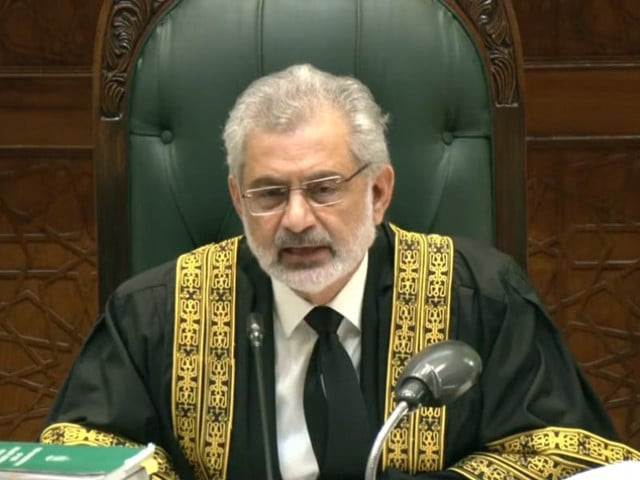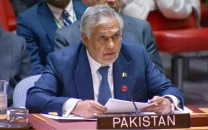SC debates martial law, pressure, procedural doubts in Bhutto case
CJ says heirs of late Bhutto will also be heard in presidential reference

The Supreme Court on Tuesday delved into intricacies of the presidential reference about the death penalty awarded to former prime minister Zulfikar Ali Bhutto more than four decades ago, asking questions about the historical and contemporary legal frameworks.
During a hearing of the reference, Chief Justice Qazi Faez Isa, Justice Mansoor Ali Shah, and Justice Jamal Mandokhel raised several law points, concerning institutional action and individual initiative in enforcing martial law, importance of assessing cases on a contextual basis and the procedural matters.
Heading a nine-member bench, Chief Justice Isa questioned whether the commencement of legal proceedings against Bhutto during the martial law period could be disregarded.
He observed that a martial law was not declared by the military as an institution rather it was an individual’s initiative.
Prompting a broader contemplation of the role of institutions in drawing boundaries within the legal landscape, he said: “We are looking at the past but not considering the future. Shouldn’t institutions also draw the line?”
Justice Mansoor remarked that such cases might come up in the future, therefore, instead of an opinion on the reference, the bench should look at the cases when they arose.
The chief justice remarked that the court’s focus was on the constitutional aspect, adding that a case could not be revised twice.
Justice Mansoor remarked that the real question in this case was whether or not the proper process was followed in the court proceedings.
However, Justice Mandokhel said that the case had attained finality, therefore, the question in the reference could be decided in an appeal.
The chief justice asked amicus curie Makhdoom Ali Khan, was there a question of bias or an admission of wrongdoing in this case. Makhdoom replied that a judge, who sat on the apex court bench on Bhutto’s appeal, had said in an interview that there was pressure on them.
Read more: PPP submits written reply in Bhutto case to SC
However, the chief justice pointed out that the judge did not say that he was biased.
He added that if a judge could not withstand pressure, he should leave the bench.
Further, he continued, a person might raise the issue of prejudice, but others might not have the same opinion.
The chief justice also enquired about a judge’s remarks about a cat in the Bhutto case.
Makhdoom said that Justice Qaiser Khan had once said that “even a cat cannot be hanged”, on the basis of the evidence in the Bhutto case and that the manner in which Bhutto’s case was decided had never happened before.
Makhdoom said that Bhutto’s case bench member Naseem Hasan Shah had dilated on the differences between Bhutto and Justice Molvi Mushtaq.
Naseem had said that Mushtaq was unhappy with Bhutto for ignoring eight senior judges and appointing Justice Aslam Riaz as the chief justice.
The chief justice said that Naseem was talking about other judges. He then asked where it was stated that he was under pressure to take a decision.
Makhdoom replied that it was not specific to this case but in the overall context.
Naseem – who retired as the chief justice of Pakistan – had also said that the court could have given the benefit of the doubt, but it did not because of its weakness and that the then defence counsel Yahya Bakhtiar had angered the judges, Makhdoom said.
He added that Naseem had said in an interview that Bhutto’s lawyer did not argue for reducing the sentence and had angered the judges.
The chief justice remarked that if one got angry, then he could have stopped hearing the case, adding that the client should not be punished for the lawyer’s conduct.
The chief justice said Bhutto’s case was the first in the history of Pakistan where the trial took place at a high court, which consequently, took away the right to appeal.
He also referred to the Supreme Court’s 4-3 ruling that upheld Bhutto’s hanging. “Can death penalty be given with a ratio of 4-3.”
Justice Mansoor said that there was only one interview related to pressure on the judges.
He asked whether those, who were accused of partiality, should also be heard.
He pointed out that those who disagreed with the decision had to leave the country.
Later, the court ordered that as Makhdoom had given gave his arguments, his written statement be submitted. It added that another amicus curie Khalid Javed Khan had made his written submission and he could give his oral arguments at the next hearing.
The court said that heirs of the late Bhutto would also be heard, including Bilawal Bhutto Zardari’s lawyers Farooq Naek, Raza Rabbani, and Zahid Ibrahim.
The court said that Ahmad Raza Kasuri, would also be heard.
The attorney general apprised the bench that he would take a little time at the end. The court was adjourned till Feb 26.



















COMMENTS
Comments are moderated and generally will be posted if they are on-topic and not abusive.
For more information, please see our Comments FAQ